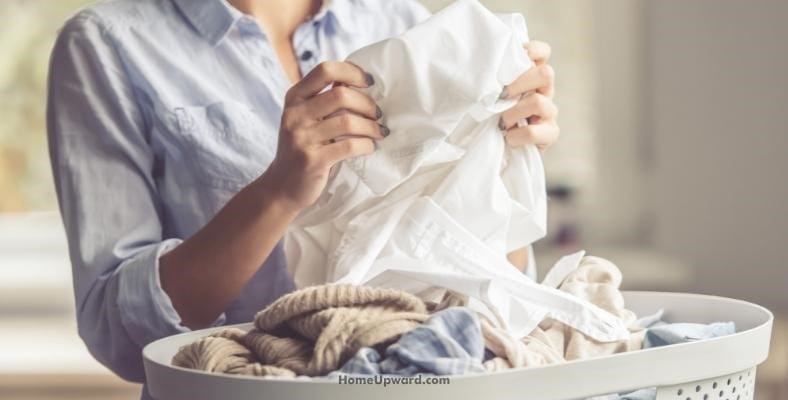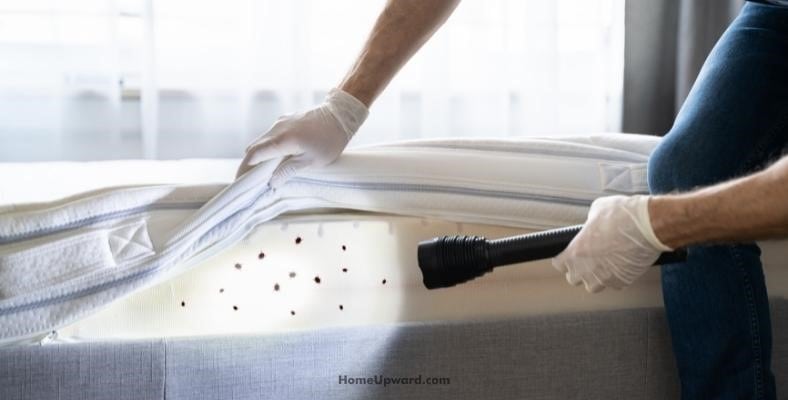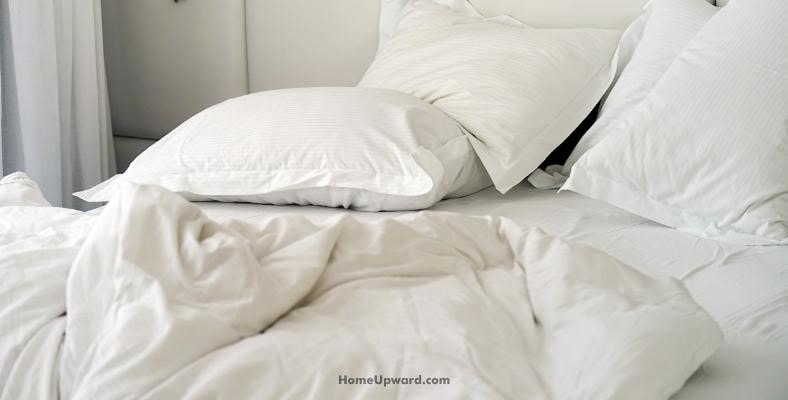Fresh, clean bedding is always a delight to enjoy when it’s time to lie down. But how often should you wash them, and are there any helpful tips you could use? You’re in the right place!
Contents
How Often Should You Wash Your Blankets and Sheets?
While most people don’t wash their sheets for a little over three weeks, it’s better to do it at the end of each week but no later than every two weeks.
If you’re not sleeping on the mattress every day that buys you some time – but ideally you’ll want to keep the time to no more than 14-16 days as a rule.
What affects how soon you should wash bedding?
You’ll need to wash your bed linens more frequently than every seven days in certain situations. For example, pets can do quite a number on beds, and if they sleep there each night, you’ll want to wash your sheets every three to four days.
If you have asthma or allergies, you might find that washing this often helps to improve your symptoms.
Additionally, even if you don’t have pets, you can stand to wash the sheets every four to five days during the summer months because you’re more likely to sweat on the bedding.
Consider throwing your sheets in the laundry at least once a week if any of the following apply to you:
- You allow your children to sleep in your bed
- You have pollen or first allergies
- You have or have been around someone with a contagious illness
- You have dust or pollen allergies
- You or someone that sleeps in the bed sweats a lot
Blankets and comforters
For throw blankets or a comforter, one time at some point of every season should suffice. A top to keep your bedding free of dust mites is to place them on the dryer for around 15 minutes.
While washing sheets and adding more loads to your laundry day can be tedious, you’ll likely get persuaded to adjust your schedule once you realize what happens behind the scenes when you don’t wash your bed linen on schedule.
How Often Should You Change Your Sheets?
How often you change your sheets depends on several factors but it mostly goes with how often you wash them.
For example, if you’re washing your sheets after one week, you should probably have a spare pair of sheets until the others are clean.
Is it OK to Change Bed Sheets Once a Month?
It’s not good to wash your sheets just once a month because of how many things you’re exposed to daily. Within one month a lot can accumulate on the sheets.
When you don’t wash your sheets regularly they accumulate thousands of dead skin cells, sweat, bodily secretions, pollen, bacteria, animal dander, and even fungi.
These substances may not make you sick immediately, but they could. They could also cause asthma flare-ups or contact dermatitis.
How Often Should You Change Pillow Cases?
It is enough to wash your pillows every six months, but ideally, you should give your pillows a good wash four times a year.
The pillowcases should be on the same schedule as the other bedding but no less than seven to ten days should pass without washing.
Can You Get Bed Bugs by Not Washing Sheets?
Bed bugs are parasites that appear to be brown and thrive in areas where heat and blood are abundant. That makes your bed the perfect breeding ground for an infestation.
You can see bed bugs starting to form and if you look closely you’ll be able to see the difference between adults and nymph bed bugs.
A common misconception is that bed bugs have to do with cleanliness. The truth is that a dirty bed doesn’t make you more vulnerable to bed bugs.
The myth about dirty sheets bringing bed bugs is likely because you can’t identify bed bugs when your sheets aren’t clean which can make the infestation worse.
What Happens if You Don’t Wash Your Pillow?
Our faces touch the pillow every night and various times throughout the day if we take naps. That means everything from our hair and faces gets transferred onto the pillowcase.
So what happens if you forgo washing your pillow covers? Take a look at what might be happening that you might not have considered.
Can Dandruff Get in Your Pillow?
Typically the scalp remains in contact with your pillow throughout the night. For some individuals, this may be enough contact to mild dandruff.
However, it won’t cause visible dandruff on your pillow.
Why Do Pillows Turn Brown or Yellow?
Over time, your pillow will turn brown; for others, the color can even be yellow.
Sweat
People tend to sweat while we’re sleeping, even if we’re unaware of it. Other people may even sweat excessively during sleep because of medical conditions.
However, sweating during sleep is a function of your body attempting to regulate its temperature in most cases.
As you can imagine, your body oils and sweat seep into the pillow over time. The sweat and oil then dress up and change the color of the pillow.
This all happens due to the area, which is a substance that’s present within your sweat.
Drooling
Apart from sweat, drooling while sleeping is one of the chief reasons for pillow discoloration. With a quick examination of your pillow, you can quickly identify the stains of dried drool.
These stains appear as brown spots; moreover, if you are someone who drools a lot, you’ll find them all over your pillow.
Wet Hair
It’s commonplace for people to shower before going to bed. Consequently, your pillow will inevitably become wet because of your hair.
Having a damp pillow can cause your skin to be moist and oily, leading to discoloration. The humidity attracts dust and dirt, eventually leaving permanent brown stains.
Product Residue
Many women and men have a skincare regimen that they perform at night, consisting of lotions, moisturizers, or toners. These kinds of products always leave behind residue on your pillow.
There are some women who, through habit, go straight to bed with their makeup still on after night. As a result, the cushion absorbs all bronzers, highlighter, and foundation.
Bedding Frequently Asked Questions (FAQs)
Below are some answers to the most commonly asked questions concerning how often to wash bedding:
How often should pillow covers be washed?
You should wash pillow protectors at least once a week, especially if you have sensitive skin. If you’re someone who gets rashes quickly after only a few days of sleeping on your pillow, you should wash your pillowcase weekly.
Replace the pillow itself two times a year.
Why do clean sheets and blankets feel great?
Cotton sheets and silk sheets tend to absorb skin oils and sweat from your body. Over the week, your sheet could have absorbed a lot of sweat and drool from the person or people sleeping in the bed.
The sheets feel better without any residue after you wash them.
Also, the dryer and whatever products you use in the laundry machine and dryer make them softer and fluffier, plus the scent is relaxing!
How often should you wash a mattress protector?
Mattress protectors are there to help lengthen the life of your mattress and, therefore, should be cared for as well.
Since a fitted sheet goes over the mattress cover, it only has to be washed every one to two months.
How long do bed sheets last before replacing them?
Signs of visible wear and tear are excellent indicators of when to replace your sheets. Thinning, fading, and yellowing are some signs that you can look out for.
You should replace sheets every two to three years.






